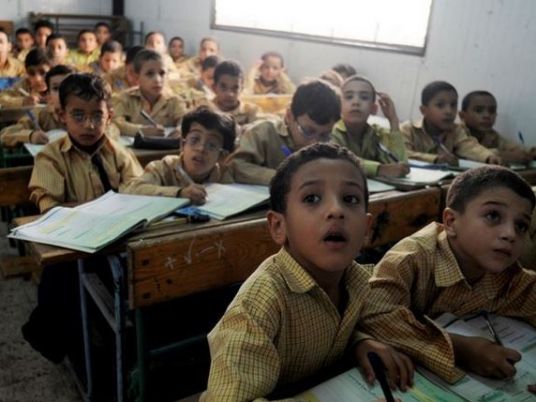Raising children has never been easy. Parents prepare their children to face life's challenges, but along the way they have to learn how to set the appropriate rules for each childhood stage as well. Azza Karim, who is a professor at the National Center for Social and Criminological Research and received her PhD in sociology, sat down with Al-Masry Al-Youm for a session on the ground rules for establishing a solid parent-child relationship.
Toddler and preschool stages (ages one to five years):
Karim explains that at this stage in life, "Parents must not yell at their kids because even at this young age, children start to be aware of their surroundings." She believes that yelling is an ineffective way to teach good behavior and that on the contrary, it can lead to personality and mental health disorders.
"Never let your child adopt the habit of lying because it will soon become an instinct that cannot easily be got rid of," says Karim. You should not stop them lying by yelling, in fact, Karim explains, "Often children are lying because they are afraid of angry reactions from their parents. You must speak with them quietly and listen to the reasons behind their lies."
The school-age stage (ages five to ten years):
During this stage kids’ characters start to form as they begin socializing with different people at school. Karim believes that as parents, "You must focus on instilling ethics in your child in order to make sure that he will not adopt bad behaviors."
In addition, parents must set a good example to their children. "You cannot instruct them to give up a bad habit while you yourself have the same habit," she explains.
The preteen stage (ages ten to 12 years):
Karim explains that the preteen stage is crucial for setting the groundwork of the teenage stage.
During this stage, the relationship between parents and their children must take a different route. "Your treatment must be a mix of parenting and friendship," explains Karim. "If you find a balance between both, this will result in mutual respect and trust." She advises parents to indirectly encourage their children to take their own decisions by listening, understanding and communicating.
"Parents should also try to discover their child's inclinations and encourage them to take up a sport, learn to play a musical instrument, learn to dance or take painting classes," says Karim. "These hobbies will fill their leisure time and develop their talents."
On the other hand, Karim advises against being totally lenient. "You should not let your children spend extended time in front of the television, Playstation or surfing the Internet aimlessly, chatting on social networking sites."
The teenage or adolescent stage (ages 12 and up):
Karim believes that if parents succeed in being a friend to their children in the previous stage, this one will be much easier for everyone.
"Teenagers are developing their own language nowadays," warns Karim, "some terms have become unfamiliar to parents and consequently, you have to keep an eye on your child's language and if it is inappropriate, instruct them to refrain from using it."
It is important to make sure that parents watch their own language–Karim explains that any harsh language used in the house will be internalized by teenagers and imitated.
Draw up rules for your child to ensure discipline, but make sure first that they are logical and fair. "Do not criticize and reject everything because continuous rejection builds up a barrier of anger and miscommunication," says Karim. "If you discuss problems with them and evaluate the situation from their perspective as well, you will be able to communicate more efficiently."
"In order to encourage independence, let teenagers take some of their own decisions," advises Karim. "Giving them the choice teaches them to distinguish between right and wrong and to take up to new challenges." In addition, Karim believes that paying for their own mistakes is a precious lesson that makes them more responsible.
Azza Karim's punishment and reward guidelines:
If your child steps out of line, you have to instruct first, then give a warning notice more than once. Smaller children don't necessarily understand what they have done wrong, so be consistent about reacting to behavior you would like to get rid of.
Starting from school age, children are aware of the consequences of their wrong actions, so getting angry and taking away privileges is more effective than for younger children. Remember it is all about righting a wrong, not merely punishment. You have also to take into consideration that yelling for no good reason will make your children afraid of you.
When you threaten as a warning, you must use realistic threats. In other words, warn about punishments you can really do or else you are losing credibility and consequently losing control.
Never impose a punishment and then take your word back. You have to be firm and stick to rules in order to teach a child to follow and respect them.
Make sure that you do not punish or humiliate your child in public, because this will affect the child on a psychological level.




